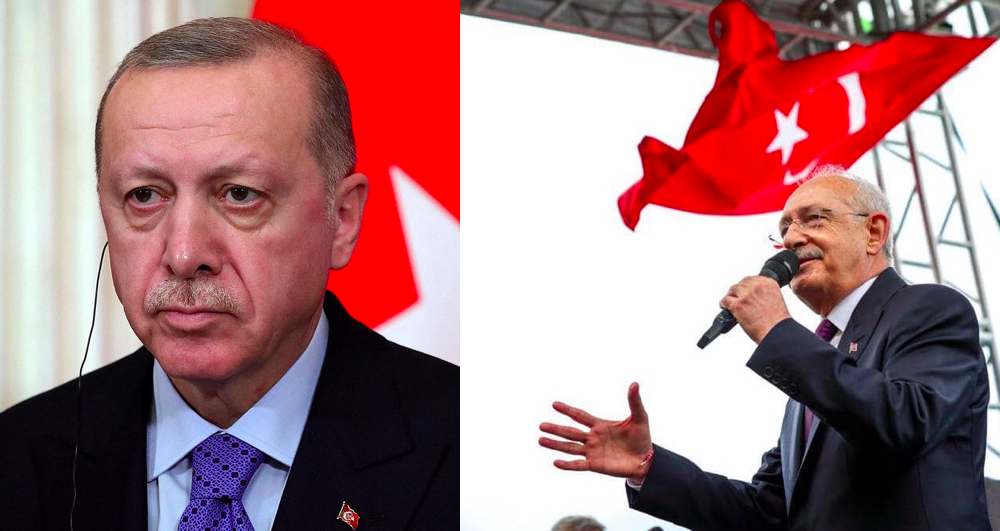How the elections in Türkiye will go according to the former EU ambassador

If Kemal Kiliçdaroglu, the main rival candidate of the current president Erdogan, were to win the elections in Turkey, which will be held on May 14th, Turkish-European relations would be facilitated, however, other problems could arise… Here is what he told Le Monde the former EU ambassador to Turkey
European leaders have been dealing with Turkish President Recep Tayyip Erdogan for twenty years and are accustomed to his oratory and military expeditions. But now, a scenario long thought unlikely – the election of opposition leader Kemal Kiliçdaroglu – is plausible, if not probable. Are European leaders ready to face the consequences, positive or problematic, of such a regime change? Hypothetical reflections by the former EU ambassador to Turkey, Marc Pierini, in Le Monde .
One can easily imagine the reaction of the majority at the table of the European Council, which is an audible sigh of relief. Enough with the jokes about German chancellors as "Nazis", about Dutch leaders as "leftovers of Nazism" or with the insults aimed at the French president. More fundamentally, the release of prisoners of conscience, the path to a rapid return to the rule of law, the necessarily longer restoration of a parliamentary democracy, the cleansing of a hitherto highly politicized judicial system, the emergence of a free press would be reason of satisfaction for European political leaders and, last but not least, for Western investors.
The tangible consequence of such a change of tone would be the resumption of a multi-voiced dialogue, now at a standstill, on a wide range of subjects: foreign policy, commercial relations (especially around the Customs Union) and financial relations, visas, migrations, environmental issues, strategic autonomy, the European Political Community and, why not, the defense industry. Clearly, respect and trust would return.
THE INEVITABLE RUSSIAN PRESSURE
The other highly strategic consequence would derive from the electoral promise of the "Table of Six" – the opposition coalition led by Kiliçdaroglu – of a return to institutionalized diplomacy and a normalization of relations with NATO. This would mean changing the current "balanced policy" between NATO and Russia, through which Turkey has created a strategic ambiguity that benefits only Moscow and not peace, contrary to Ankara's constant media staging.
The implementation of these intentions by the new president has yet to be evaluated. What would happen to the circumvention of Western sanctions against Russia through industrial operations in the Turkish petrochemical sector? Will Turkish forces participate in NATO defensive operations on its eastern flank, from Estonia to Romania? Would they end the presence of Russian S400 missiles on Turkish territory, installed in July 2019 at the expense of the Atlantic Alliance's missile defense? These are very delicate issues, but also hopeful at a time when the strategic balance of the European continent is at stake.
However, will Turkey's new leaders be able to withstand the inevitable Russian pressure in these different areas of play? Especially since Moscow could activate the pressure tactics carefully implemented during the Erdogan era: gas sales with the TurkStream pipeline, the (Russian-owned) Akkuyu nuclear power plant, Russian tourism or even agricultural purchases.
And the return of Syrian refugees. Such initiatives would inevitably complicate the fight of Western forces against the Islamic State forces in east-central Syria. Furthermore, a policy of systematic return of Syrian refugees to their country, in the absence of an internationally agreed legal framework, would pose a serious risk to their safety and the exercise of their rights. It would be necessary to manage a complex web of political, military and humanitarian differences.
RELAUNCH THE DIALOGUE
Even more controversial would be the handling of the Cypriot question. Indeed, the status of the Turkish Cypriot community is a matter of consensus in Turkey and the accession of the Republic of Cyprus to the European Union, which took place on 1 May 2004 without having first reached a global agreement on the future of the island, has never been accepted by the entire Turkish political class. The granting of EU negotiator status to Turkey in December 2004 did nothing to allay this frustration. No agreement has so far been reached on the internal balance between the Greek and Turkish communities in Cyprus or on their rights relating to potential natural resources in the island's territorial waters, and greater flexibility on these issues cannot be expected after the eventual arrival of a new president in Turkey.
This is not the place to speculate on the results of the May 14 presidential and parliamentary elections, because these elections belong only to Turkish citizens. From abroad, one can only hope that they will take place on a regular basis, even for the citizens affected (and, for many, displaced) by the catastrophic earthquakes in the south-east of the country.
On the other hand, European leaders must prepare for the possibility of an alternation at the top of the Turkish state, or even a cohabitation between a new president and a parliament that has remained mostly loyal to the Justice and Development Party (AKP). . Preparing does not only mean carefully drafting the usual congratulatory and encouraging statements, but above all relaunching the dialogue between Turkey and the European Union, currently non-existent at the highest levels, and organizing concrete support on a new basis. The list of topics to be discussed is vast, positive and thorny at the same time, but offers a unique opportunity to re-establish relations with a partner country which weighs heavily on the future of the entire European continent.
(Excerpt from the foreign press review by eprcomunicazione )
This is a machine translation from Italian language of a post published on Start Magazine at the URL https://www.startmag.it/mondo/come-andranno-le-elezioni-in-turchia-secondo-lex-ambasciatore-ue/ on Sun, 09 Apr 2023 06:02:08 +0000.
